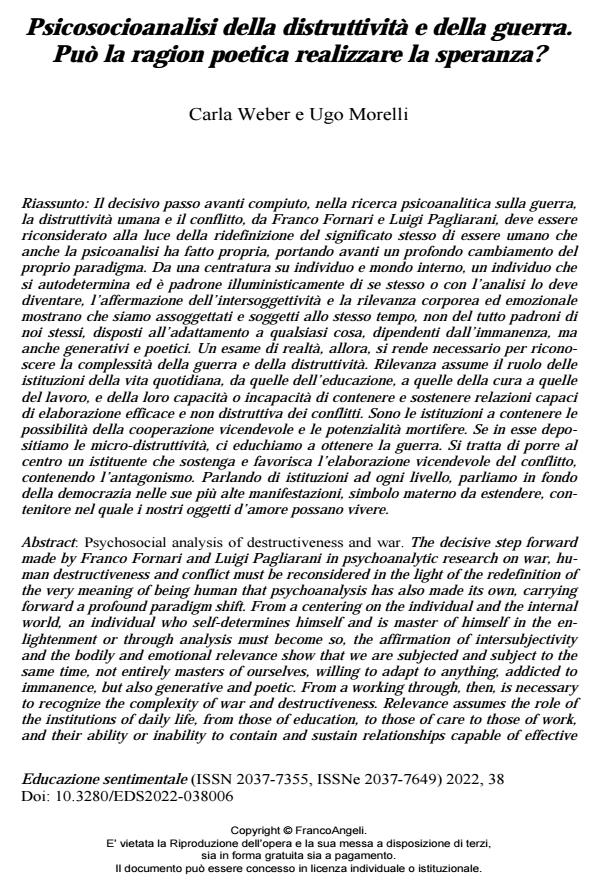Psicosocioanalisi della distruttività e della guerra. Può la ragion poetica realizzare la speranza?
Journal title EDUCAZIONE SENTIMENTALE
Author/s Carla Weber, Ugo Morelli
Publishing Year 2023 Issue 2022/38
Language Italian Pages 11 P. 61-71 File size 202 KB
DOI 10.3280/EDS2022-038006
DOI is like a bar code for intellectual property: to have more infomation
click here
Below, you can see the article first page
If you want to buy this article in PDF format, you can do it, following the instructions to buy download credits

FrancoAngeli is member of Publishers International Linking Association, Inc (PILA), a not-for-profit association which run the CrossRef service enabling links to and from online scholarly content.
Psychosocial analysis of destructiveness and war. The decisive step forward made by Franco Fornari and Luigi Pagliarani in psychoanalytic research on war, hu-man destructiveness and conflict must be reconsidered in the light of the redefini-tion of the very meaning of being human that psychoanalysis has also made its own, carrying forward a profound paradigm shift. From a centering on the indi-vidual and the internal world, an individual who self-determines himself and is master of himself in the enlightenment or through analysis must become so, the affirmation of intersubjectivity and the bodily and emotional relevance show that we are subjected and subject to the same time, not entirely masters of ourselves, willing to adapt to anything, addicted to immanence, but also generative and po-etic. From a working through, then, is necessary to recognize the complexity of war and destructiveness. Relevance assumes the role of the institutions of daily life, from those of education, to those of care to those of work, and their ability or inability to contain and sustain relationships capable of effective and non-destructive elaboration of conflicts. It is the institutions that contain the possibil-ities of mutual cooperation and the deadly potential. If we deposit micro-destructiveness in them, we educate ourselves to obtain war. If we deposit micro-destructiveness in them, we educate ourselves to obtain war. It is a question of placing an instituting at the center that supports and favors the mutual elabora-tion of the conflict, containing the antagonism. Speaking of institutions at all levels, we are basically talking about democracy in its highest manifestations, a maternal symbol to be extended, a container in which our love objects can live.
Keywords: war, destructiveness, creativity, generativity, repository, institution, democracy, poetic reason.
- Amati Sas S. (1992). Ambiguity as the route to shame. International Journal of Psychoanalysis, 73, pp. 329-341.
- Amati Sas S. (2004). La violenza sociale traumatica: una sfida alla nostra adattabilità inconscia. In F. Borgogno, a cura di, Ferenczi oggi. Torino: Bollati Boringhieri.
- Amati Sas S. (2005). Ambiguity as a defence in extreme trauma. Panel on Trauma and torture. IPA Congress, Rio de Janeiro. In A. Gautier e A. Sabattini Scalmati, a cura di, Bearing Witness. Psychoanalytic Work with People Traumatised by Torture and Extreme State Violence. London: Karnac Books, 2011, pp. 3-12.
- Amati Sas S. (2010a). L’ambiguità come difesa in condizione di trauma estremo. Frenis Zero, VII(13).
- Amati Sas S. (2010b). Quale inconscio per il transculturale?. Relazione presentata al XV Congresso SPI, Taormina, maggio 2010.
- Amati Sas S. (2019). Ambiguità, conformismo e adattamento alla violenza sociale. Milano: FrancoAngeli.
- Bleger J. (1967). Simbiosi e ambiguità. Loreto: Libreria Editrice Lauretana, 1992.
- Esposito R. (2021). Istituzione. Bologna: il Mulino.
- Fitzduff M. (2022). Cervelli in fuga. Neuroscienze del conflitto e del peacebuilding. Torino: Codice Edizioni.
- Fornari F. (2023). Psicoanalisi della guerra. Milano: Feltrinelli.
- Freud S., Einstein A. (1933). Perché la guerra. Torino: Bollati Boringhieri, 1955.
- Pagliarani L. (1985 e 1992). Il coraggio di Venere. Anti-manuale di psico-socio-analisi della vita presente. Milano: Raffaello Cortina Editore.
- Pichon-Rivière E. (2001). El Proceso Grupal. Del psicoanálisis a la psicología Social (I). Buenos Aires: Nueva Visión.
- Stern D. (2010). Le forme vitali. Milano: Raffaello Cortina, 2011.
- Sue D.W., Spanierman L.B. (2022). Le microaggressioni. La natura invisibile della discriminazione. Milano: Raffaello Cortina Editore.
Carla Weber, Ugo Morelli, Psicosocioanalisi della distruttività e della guerra. Può la ragion poetica realizzare la speranza? in "EDUCAZIONE SENTIMENTALE" 38/2022, pp 61-71, DOI: 10.3280/EDS2022-038006